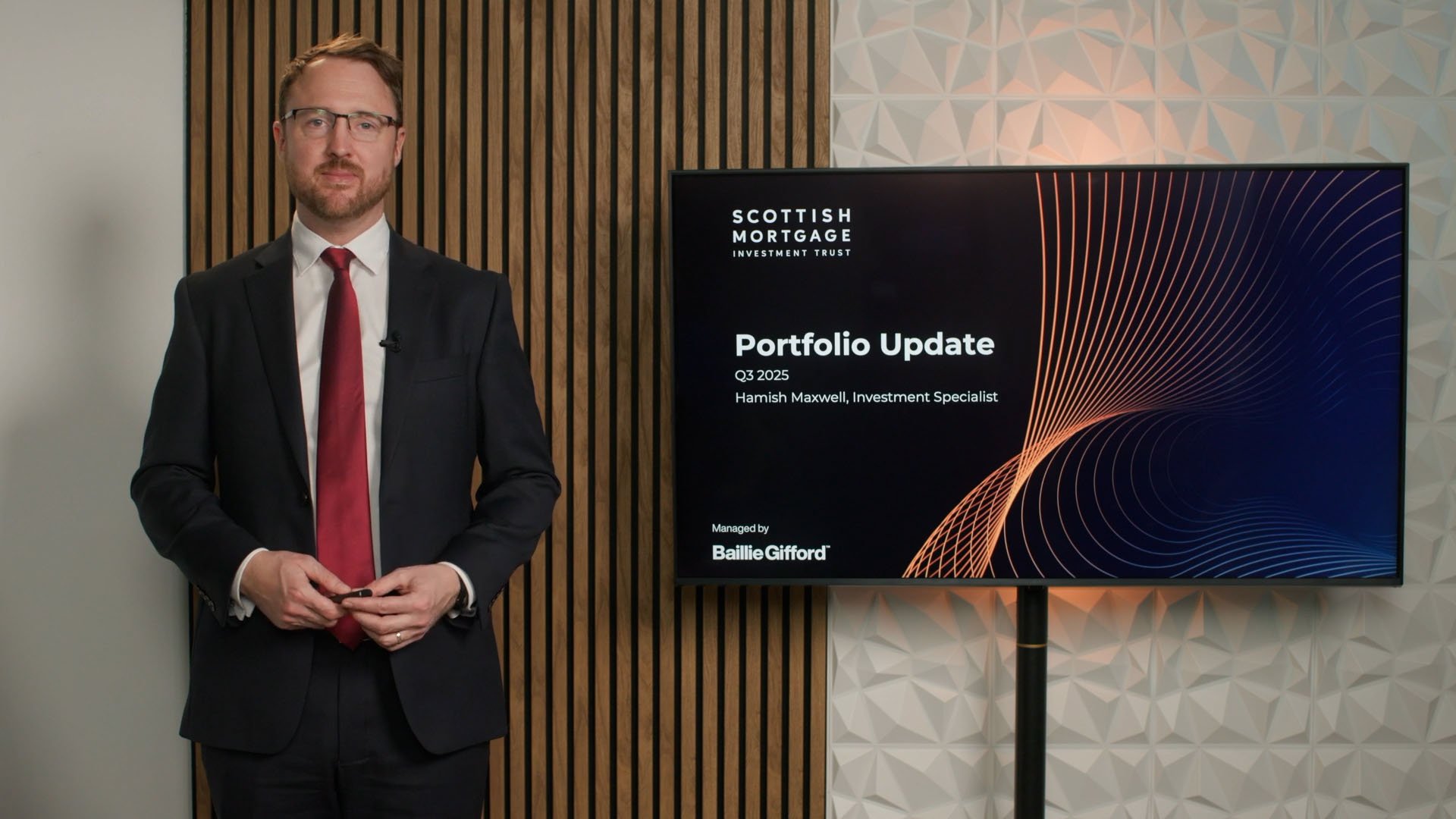Interim management report
Tom Slater – Manager, Scottish Mortgage
Key Points
- The portfolio remains in a robust position despite recent underperformance – over five and ten years, the net asset value per share has increased substantially
- Technological progress, most notably in AI, should advance several industries, and private company opportunities look promising
- Economic and geopolitical news is rarely reassuring, but we remain optimistic thanks to entrepreneurial creativity

As with any investment, your capital is at risk.
Our portfolio of growth investments is in robust health. Financial conditions have pushed companies to focus and prioritise profitable growth. Declines in stock prices have made valuations more attractive. This combination provides a strong underpinning for the long-term outlook.
We will have periods when we underperform the market, and the six months in question was one. Since the end of March, our net asset value per share, with debt at fair value (‘NAV’), fell by 2.7 per cent compared with a rise of 4.3 per cent for the FTSE All-World Index (both in total return terms). The longer-term performance record remains good. Over five years, the NAV has gained 59.6 per cent versus 49.6 per cent, and over 10 years it has increased by 358.1 per cent against 189.5 per cent (both against the index).
Although our focus remains on long-term capital appreciation, we know that a small and consistent dividend is of value to many shareholders. The Board is therefore recommending an interim dividend of 1.60p per share, no increase over last year’s payment.
Our objective is to find companies with the potential for exceptional growth and then own them patiently as they deliver. There are times when stock markets reward this approach and times, as now, when they do not. We constantly revisit the case for our investments and expect that we will sometimes find our optimism misplaced. However, we do not revisit the underlying investment philosophy that has served us well for many years. The value created by the innovation and dedication of exceptional companies will deliver returns for our fellow shareholders. In turn, Scottish Mortgage’s patient ownership and support can increase the likelihood of entrepreneurial success.
Not all large companies capable of outsized growth are listed on public stock markets. Accessing such opportunities at a reasonable cost is a distinctive part of our role for shareholders. The operational performance of our major private businesses has been strong despite the difficult prevailing conditions. The average revenue growth rate of the top ten private holdings was 38 per cent in 2022. Market scepticism around the performance and valuation of our private assets is misplaced, and we believe they will be a significant source of value creation for the Trust in the coming years. We deployed approximately £74mn into six private companies in the half year, and one of our private holdings, the beauty company ODDITY, went public.
Divining much that is useful from stock markets over a six-month period is challenging. The market’s positive return has been driven by a handful of large technology companies that would seem to be the early beneficiaries of developments in Artificial Intelligence (AI). The capabilities of today’s AI systems are sufficient for widespread commercial deployment. Their ability to communicate in natural language based on an ‘understanding’ of the relevant concepts lends itself to many different use cases. Building a foundational AI model can cost billions of dollars, so only those with the deepest pockets can compete. Giant consumer technology companies have those resources and vast user bases to whom they can deploy the resulting applications.
Chipmaker NVIDIA, whose shares we bought in 2016, has been the key provider of the necessary computing infrastructure for AI, or as CEO Jensen Huang put it, ‘if you don’t build it, they won’t show up’. The acceleration in its business has been breath-taking. Revenue guidance for the third quarter is $16bn, which compares to less than $6bn a year ago. The step change that we have seen in AI’s capabilities would have been impossible without NVIDIA’s silicon. The pace of progress has exceeded our expectations and has been well ahead of what Moore’s Law would have dictated for traditional computing. Instead of seeing the end of an aberrant growth era, we may be entering a period of even faster development. If so, the consequences will be yet more profound.
We are mindful that the pioneers may be the easiest to identify when seismic shifts occur in the technology landscape, but they are not always the biggest beneficiaries. Often, nimble new entrants emerge and arrogate opportunities before a dominant incumbent can react. This creates dramatic and long-lasting investment opportunities, as we saw in the PC, Internet and Mobile transformations.
We do not claim to be able to predict macroeconomic developments and are often bemused by the level of coverage given to the future course of interest rates. We can, though, observe the changes we have seen at the companies we own. Unable to assume that markets will provide capital, they are generating their own supply. They are trimming costs and focusing on the most promising projects. We are encouraged that they continue to spend heavily on research and development but believe a higher cost of capital introduces a healthy dose of prioritisation. The free cash flow from our listed portfolio more than doubled in the twelve months to the end of June.
Rising rates have little impact on our company. During the years of exceptionally low interest rates we proactively extended the term of our debt. The majority of our borrowings do not come due until after 2036 and our interest cost is below 3 per cent.
Progress is being made across a broad swathe of technologies. What makes this so exciting for growth investors is that the number of ways companies can combine these technologies grows exponentially. Accelerated computing drives artificial intelligence, which can be applied to vast datasets in the Cloud, enabling breakthroughs in healthcare and so on. Our companies are fitter for the future, and the opportunity they address grows at an accelerating pace. Economic news is usually dreary, and geopolitics rarely reassuring, but entrepreneurs’ collective creativity and productivity are a source of great confidence and optimism.
Scottish Mortgage Annual Past Performance To 30 September each year (net %)
|
|
2019 |
2020 |
2021 |
2022 |
2023 |
|
The Scottish Mortgage Investment Trust PLC |
-6.4 | 97.8 | 45.5 | -45.0 | -13.9 |
Source: Morningstar, Share price, total return, sterling.
Past performance is not a guide to future returns.
Risk factors
Unlisted investments such as private companies, in which the Trust has a significant investment, can increase risk. These assets may be more difficult to sell, so changes in their prices may be greater.
The trust can borrow money to make further investments (sometimes known as “gearing” or “leverage”). The risk is that when this money is repaid by the trust, the value of the investments may not be enough to cover the borrowing and interest costs, and the trust will make a loss. If the trust's investments fall in value, any invested borrowings will increase the amount of this loss.
The trust can buy back its own shares. The risks from borrowing, referred to above, are increased when a trust buys back its own shares.
Legal notice
London Stock Exchange Group plc and its group undertakings (collectively, the “LSE Group”). © LSE Group 2019. FTSE Russell is a trading name of certain of the LSE Group companies. “FTSE®" and “Russell®” are trade marks of the relevant LSE Group companies and are used by any other LSE Group company under license. “TMX®” is a trade mark of TSX, Inc. and used by the LSE Group under license. All rights in the FTSE Russell indexes or data vest in the relevant LSE Group company which owns the index or the data. Neither LSE Group nor its licensors accept any liability for any errors or omissions in the indexes or data and no party may rely on any indexes or data contained in this communication. No further distribution of data from the LSE Group is permitted without the relevant LSE Group company’s express written consent. The LSE Group does not promote, sponsor or endorse the content of this communication.
About the author - Tom Slater
Manager, Scottish Mortgage
Tom Slater is manager of Scottish Mortgage. He joined Baillie Gifford in 2000 and became a partner of the firm in 2012. Tom joined the Scottish Mortgage team as deputy manager in 2009, before assuming the role of Manager in 2015. Beyond that, he is the head of the US Equities team and a member of another long-term growth equity strategy. During his time at Baillie Gifford, Tom has also worked in the Developed Asia and UK Equity teams. Tom’s investment interest is focused on high-growth companies both in listed equity markets and as an investor in private companies. He graduated BSc in Computer Science with Mathematics from the University of Edinburgh in 2000.
Regulatory Information
This content was produced and approved at the time stated and may not have been updated subsequently. It represents views held at the time of production and may not reflect current thinking. Read our Legal and regulatory information for further details.
A Key Information Document is available by visiting our Documents page. Any images used in this content are for illustrative purposes only.
This content does not constitute, and is not subject to the protections afforded to, independent research. Baillie Gifford and its staff may have dealt in the investments concerned. The views expressed are not statements of fact and should not be considered as advice or a recommendation to buy, sell or hold a particular investment.
Baillie Gifford & Co and Baillie Gifford & Co Limited are authorised and regulated by the Financial Conduct Authority (FCA). The investment trusts managed by Baillie Gifford & Co Limited are listed on the London Stock Exchange and are not authorised or regulated by the FCA.
Baillie Gifford Asia (Hong Kong) Limited 柏基亞洲(香港)有限公司 (BGA) holds a Type 1 licence from the Securities and Futures Commission of Hong Kong to market and distribute Baillie Gifford’s range of collective investment schemes and closed-ended funds such as investment trusts to professional investors in Hong Kong.
Baillie Gifford Asia (Singapore) Private Limited (BGAS) is regulated by the Monetary Authority of Singapore as a holder of a capital markets services licence to conduct fund management activities for institutional investors and accredited investors in Singapore. BGA and BGAS are wholly owned subsidiaries of Baillie Gifford Overseas Limited, which is wholly owned by Baillie Gifford & Co.
Europe
Scottish Mortgage Investment Trust PLC (the “Company”) is an alternative investment fund for the purpose of Directive 2011/61/EU (the “AIFM Directive”). Baillie Gifford & Co Limited is the alternative investment fund manager (“AIFM”) of the Company and has been authorised for marketing to Professional Investors in this jurisdiction.
This content is made available by Baillie Gifford Investment Management (Europe) Limited (“BGE”), which has been engaged by the AIFM to carry out promotional activities relating to the Company. BGE is authorised by the Central Bank of Ireland as an AIFM under the AIFM Regulations and as a UCITS management company under the UCITS Regulation. BGE also has regulatory permissions to perform promotional, advisory and Individual Portfolio Management activities. BGE has passported its authorisations under the mechanisms set out in the AIFM Directive.
Belgium
The Company has not been and will not be registered with the Belgian Financial Services and Markets Authority (Autoriteit voor Financiële Diensten en Markten / Autorité des services et marchés financiers) (the FSMA) as a public foreign alternative collective investment scheme under Article 259 of the Belgian Law of 19 April 2014 on alternative collective investment institutions and their managers (the Law of 19 April 2014). The shares in the Company will be marketed in Belgium to professional investors within the meaning the Law of 19 April 2014 only. Any offering material relating to the offering has not been, and will not be, approved by the FSMA pursuant to the Belgian laws and regulations applicable to the public offering of securities. Accordingly, this offering as well as any documents and materials relating to the offering may not be advertised, offered or distributed in any other way, directly or indirectly, to any other person located and/or resident in Belgium other than to professional investors within the meaning the Law of 19 April 2014 and in circumstances which do not constitute an offer to the public pursuant to the Law of 19 April 2014. The shares offered by the Company shall not, whether directly or indirectly, be marketed, offered, sold, transferred or delivered in Belgium to any individual or legal entity other than to professional investors within the meaning the Law of 19 April 2014 or than to investors having a minimum investment of at least EUR 250,000 per investor.
Germany
The Trust has not offered or placed and will not offer or place or sell, directly or indirectly, units/shares to retail investors or semi-professional investors in Germany, i.e. investors which do not qualify as professional investors as defined in sec. 1 (19) no. 32 German Investment Code (Kapitalanlagegesetzbuch – KAGB) and has not distributed and will not distribute or cause to be distributed to such retail or semi-professional investor in Germany, this document or any other offering material relating to the units/shares of the Trust and that such offers, placements, sales and distributions have been and will be made in Germany only to professional investors within the meaning of sec. 1 (19) no. 32 German Investment Code (Kapitalanlagegesetzbuch – KAGB).
Luxembourg
Units/shares/interests of the Trust may only be offered or sold in the Grand Duchy of Luxembourg (Luxembourg) to professional investors within the meaning of Luxembourg act by the act of 12 July 2013 on alternative investment fund managers (the AIFM Act). This document does not constitute an offer, an invitation or a solicitation for any investment or subscription for the units/shares/interests of the Trust by retail investors in Luxembourg. Any person who is in possession of this document is hereby notified that no action has or will be taken that would allow a direct or indirect offering or placement of the units/shares/interests of the Trust to retail investors in Luxembourg.
Switzerland
The Trust has not been approved by the Swiss Financial Market Supervisory Authority (“FINMA”) for offering to non-qualified investors pursuant to Art. 120 para. 1 of the Swiss Federal Act on Collective Investment Schemes of 23 June 2006, as amended (“CISA”). Accordingly, the interests in the Trust may only be offered or advertised, and this document may only be made available, in Switzerland to qualified investors within the meaning of CISA. Investors in the Trust do not benefit from the specific investor protection provided by CISA and the supervision by the FINMA in connection with the approval for offering.
Singapore
This content has not been registered as a prospectus with the Monetary Authority of Singapore. Accordingly, this content and any other content or material in connection with the offer or sale, or invitation for subscription or purchase, of the Trust may not be circulated or distributed, nor may be offered or sold, or be made the subject of an invitation for subscription or purchase, whether directly or indirectly, to persons in Singapore other than (i) to an institutional investor (as defined in Section 4A of the Securities and Futures Act 2001, as modified or amended from time to time (SFA)) pursuant to Section 274 of the SFA, (ii) to a relevant person (as defined in Section 275(2) of the SFA) pursuant to Section 275(1), or any person pursuant to Section 275(1A), and in accordance with the conditions specified in Section 275 of the SFA, or (iii) otherwise pursuant to, and in accordance with the conditions of, any other applicable provision of the SFA.
Where the Trust is subscribed or purchased under Section 275 by a relevant person which is:
(a) a corporation (which is not an accredited investor (as defined in Section 4A of the SFA)) the sole business of which is to hold investments and the entire share capital of which is owned by one or more individuals, each of whom is an accredited investor; or
(b) a trust (where the trustee is not an accredited investor) whose sole purpose is to hold investments and each beneficiary of the trust is an individual who is an accredited investor, securities or securities-based derivatives contracts (each term as defined in Section 2(1) of the SFA) of that corporation or the beneficiaries’ rights and interest (howsoever described) in that trust shall not be transferred within six months after that corporation or that trust has acquired the securities pursuant to an offer made under Section 275 except:
(1) to an institutional investor or to a relevant person or to any person arising from an offer referred to in Section 275(1A) or Section 276(4)(c)(ii) of the SFA,
(2) where no consideration is or will be given for the transfer;
(3) where the transfer is by operation of law; or
(4) pursuant to Section 276(7) of the SFA or Regulation 37A of the Securities and Futures (Offers of Investments) (Securities and Securities-based Derivatives Contracts) Regulations 2018.








